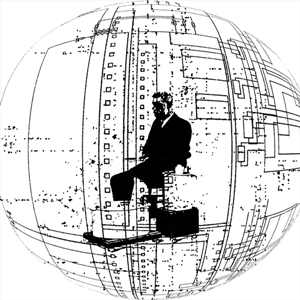It’s an itchy work which finds some pace and momentum about eight minutes in when it decides to act as a Can tribute piece: that it holds you is testament to its inherent confidence.
It’s an itchy work which finds some pace and momentum about eight minutes in when it decides to act as a Can tribute piece: that it holds you is testament to its inherent confidence.

A fine EP this; a set of urban grooves covering many disciplines and ideas – Snorkel’s looseness is evidently their strength, if their music can be put through such a sonic prism. The One Long Conundrum EP – especially the first track – has a certain similarity to the gigantic headspace Julian Cope was occupying when he released the first Rite LP. But whereas Cope’s work was restless and pressing this record feels more grounded and its fidgeting is more cerebral, more playful – used more as a ploy to keep the listener on their toes rather than an expression of any worldview.
The opening track is killer and in some ways acts as a sort of anchor for the rest of the EP: One Long Conundrum is a slow cooked mix of blaring, bleeping, metallic sound set against some precise, unobtrusive percussion. It’s an itchy work which finds some pace and momentum about eight minutes in when it decides to act as a Can tribute piece: that it holds you is testament to its inherent confidence.
There are a number of changes of style and – inevitable with a remix record really, but everything is well paced, playful and thoughtfully balanced. Wet Tongue sees rude blurts set against some spacey electronics, sounding a bit like a Studio G freak out from about 1972. It’s a track that just hangs around in the room like some primordial echo. And the jazzy, groovy and soulful Dead Skin – by Crewdson – has a charming looseness about it. It’s a lazy thing, relying on some daft vocal distortions and the fitful contributions of bass and brass to prop it up, but it’s the sort of track you could happily sun yourself in the park to. The ending’s lovely and messy with a whole bunch of indeterminate electronic spare parts meeting up and having a chinwag of sorts. By contrast Robert Logan’s Stop Machine is a restless, glitchy set of electronic squiggles and edits that is incredibly stentorian; the music has a concrete, intensely urban edge to it that which becomes almost symphonic by the end, there’s a brilliant hint of melody just before the tail out which leaves you wanting more. Loophole make the sort of baroque, widescreen statement more in keeping with a David Holmes piece, it ends all rather suddenly which is a shame but probably in keeping with the ideas that no track should rest on its laurels.
So a remarkable listen all round, highly recommended.
